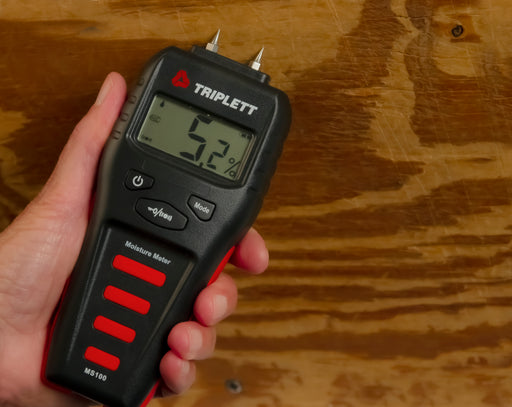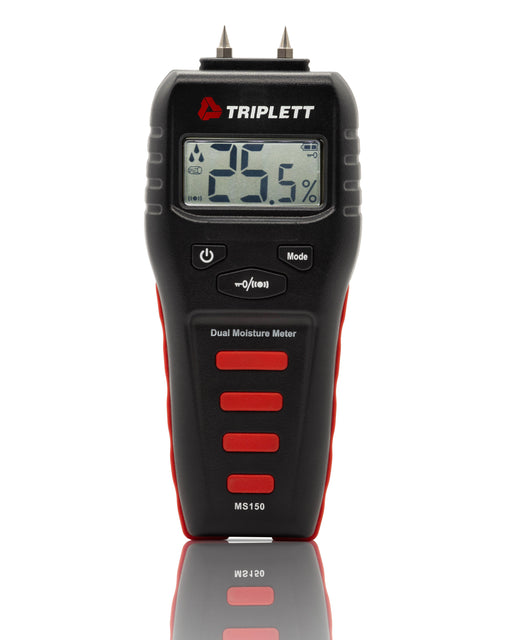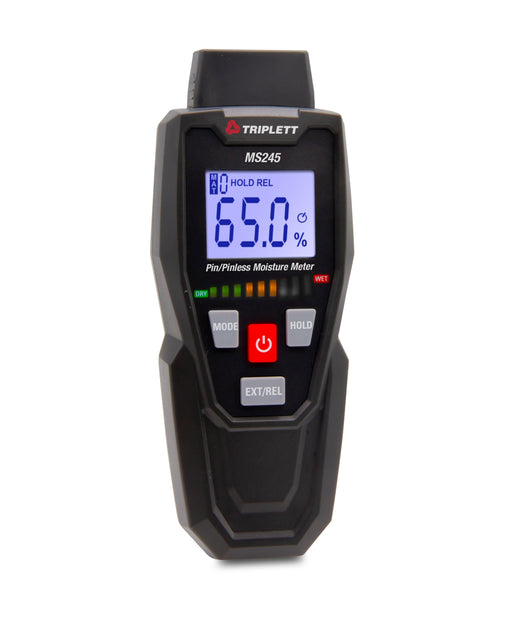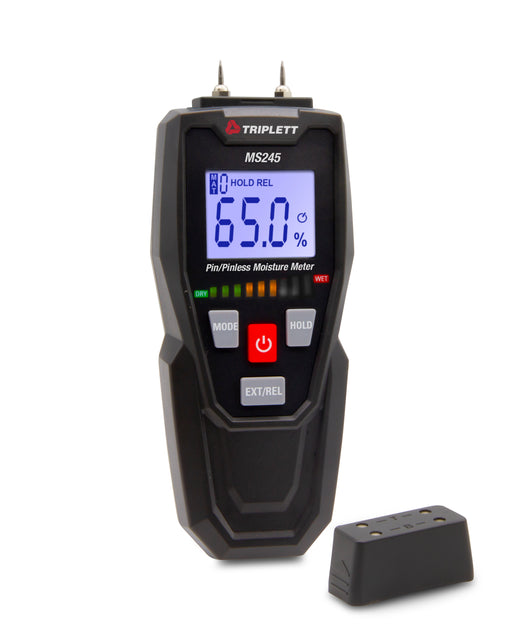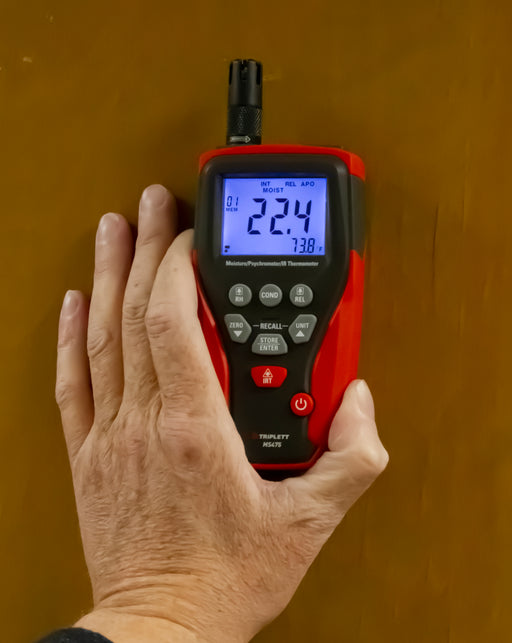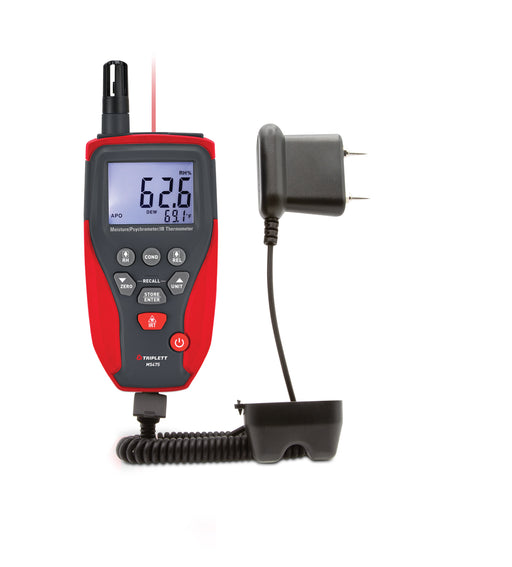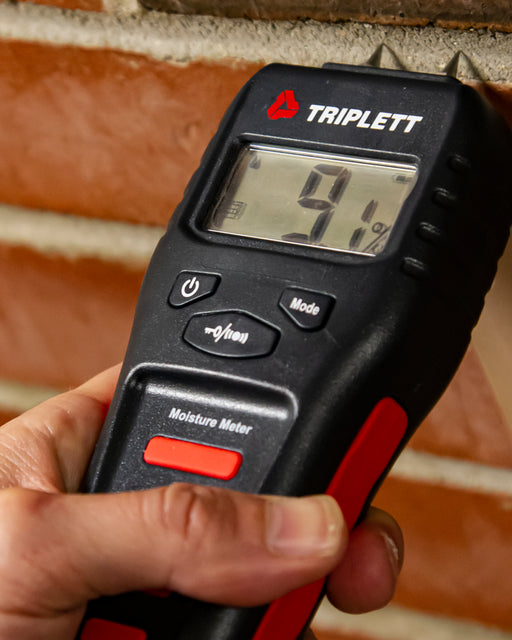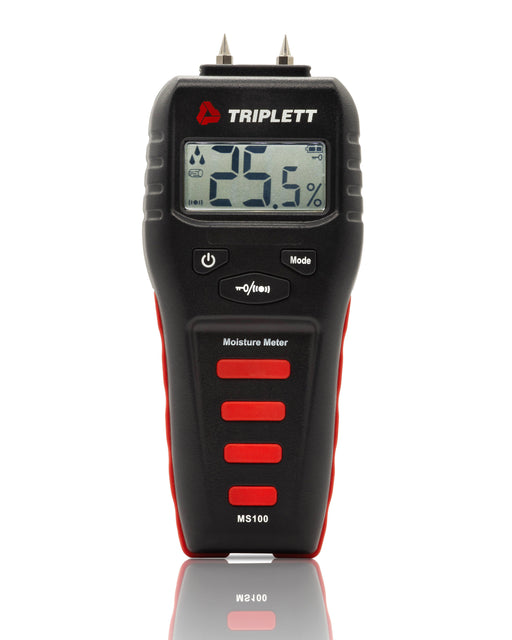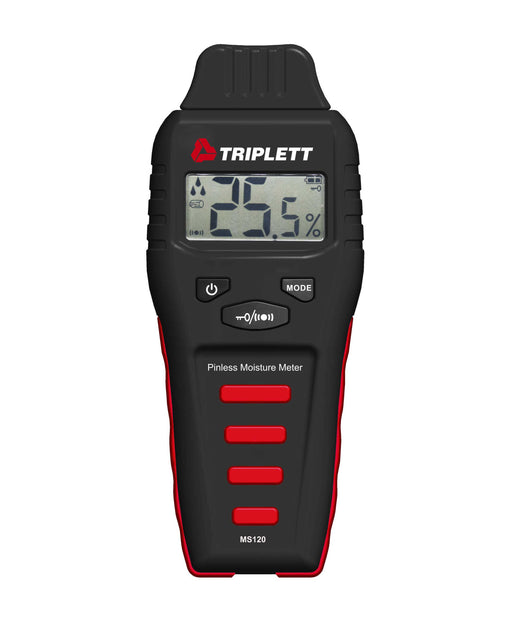Know More About Triplett Moisture Meter
What is a moisture meter?
A moisture meter senses, measures, and displays the moisture content of several materials such as metal compounds, wood, rocks, polymer compounds, paper, textiles, construction materials, woodworking, lumber, dry wall, concrete, wall, wall board, mortar, concrete, plaster, cardboard, hardwood, house, basement and other building products. Triplett offers digital moisture meters which come with a simple push button menu and an LCD display. It may be pin based for physical insertion or pinless.
What is the use of a moisture sensor?
As mentioned a moisture reader is used to detect moisture in wood, wall board, and other building materials to gage damage from flooding, high humidity, or other causes. It may also be used prior to using a material in a product to check its moisture content and gage damage from humidity, flooding, and so on. Hence, moisture meters are also used in furniture manufacturing and rebuilding, wood flooring, wooden and stone art and craft works, and so on.
Types of Moisture Meters
Our selection features a wide range of pin and pinless moisture meters for your application. Some models can be used as pin or pinless depending on the application requirement.
- Pin moisture meter : These are pin-based moisture meters which make a direct contact or penetrate the object such as a wood log or concrete to measure the level of moisture. If you are using models like MS150 then use them as pin or pinless meters. In this model, you can use pin moisture meter to measure 5-50% moisture in wood and 1.5 – 33% moisture in other building materials and pinless meter for measuring moisture content between 6% and 99.9%.
- Pinless moisture meter: This is a non-contact device that uses electromagnetic waves to measure the moisture level. The pinless moisture meter is used to measure relative moisture content in wood and other building materials (0.1 to 99.9%)
Triplett’s pin and pinless moisture meters are used for home inspection, lumber yards, water damage restoration, paper mills, painting, cloth manufacturing, and industries.
Differences between pin and pinless moisture meters
The choice between pinless and pin moisture meters depends on several factors making it essential to understand their key differences. Take a look at some of their main distinctions:
- Measurement Method: Pinless moisture meters use electromagnetic wave propagation, while pin moisture meters use metal pins or probes.
- Depth of Measurement: Pinless meters assess moisture levels near the surface, typically within 3/4 inch (20 mm), while pin meters can measure moisture across the material's thickness.
- Testing Procedure: Pinless meters conduct non-destructive testing, enabling rapid scans, while pin meters require inserting pins into the material, which can be more time-consuming.
- Level of Precision and Accuracy: Pinless meters may have lower precision, especially in materials with varying densities, while pin meters offer superior accuracy and precision.
- Suitability for Different Materials: Pinless meters are suitable for soft or finished materials, while pin meters are ideal for dense materials.
- Risk of Surface Damage: Pinless meters minimize surface damage, while pin meters may leave marks due to pin insertion.
- Cost and Complexity: Pinless meters are generally less expensive and simpler to use, while pin meters are often more expensive and require more skill.
How Does a Handheld Moisture Meter Work?
Moisture meters with pin-like probes are inserted directly into the material under test to check the moisture content. The moisture reading is then displayed on the meter screen. The unit of measure for moisture content varies from instrument to instrument some use ‘%’ and others use a relative scale from 0 to 100 where 100 represents maximum and 0 represents minimum moisture. Many meters also use a Dry, Moist, and Wet indicator for convenience. At Triplett, we offer moisture meters with audible indicators that produce beep sounds. The moisture may be indicated through low, medium, and high icons for most models. Most of our models have a lock button which freezes the value displayed on the screen. This is because, there may be a visibility issue in some areas when the moisture content is measured. Our pinless moisture meters offer non-invasive and non-destructive testing, and are used for relative measurements up to a depth of around one inch.
Do moisture meter measure humidity?
Yes, the moisture meters we provide do have multiple functionalities. Most models, aside from moisture measurement probes, also have temperature and humidity probes. They can measure moisture content, relative humidity, air pressure, dew point, air temperature, and so on. Triplett has the best variety of wood moisture meters which are used to measure moisture and relative humidity in wood.
Do moisture meters work on tile floors?
Tiles are usually made of materials that do not absorb and retain moisture. If the tile is split from the floor or wall surface, you can still measure its moisture content. However, it is not measured frequently as it is not required. Moisture meters are used during flooring and tile installation, but are more frequently used for wood flooring.
What is the range for moisture reading for concrete?
The moisture content of concrete is tested frequently. Also, concrete once watered remains wet from a few days to weeks as it absorbs moisture and retains it. Additionally, concrete slabs are thick and measured in feet and not inches. So, even if its upper portion may look dry, deep inside, the slab may hold water. Hence, it is wise to use a meter which measures the entire moisture content and not just on the surface so that deep holes are dug into these concrete slabs. For moisture measurement on concrete floors, ASTM F-2170 testing method is used and is known to be reliable. A thermo-hygrometer is used to measure this moisture content. At Triplett, we offer a Moisture/Psychrometer/IR Thermometer for this function. It is designed to measure moisture content on floors, walls, and building environment. These are reference scale meters which first test the dry portion of the slab and then the deeper part of the concrete. Usually, the ranges for building materials including concrete are as follows:
- Low: 1.5 to 16.9%
- Medium: 17.0 to 19.9%
- High: 20.0 to 33.0%
Applications of Moisture Meters
Moisture meters have a wide range of applications across various industries. Here are some common applications of moisture meters:
-
Building and Construction
- Identifying water leaks or potential water damage by detecting moisture in walls, floors, and ceilings.
- Ensuring proper drying and prevention of issues like mold or rot by monitoring moisture levels during construction or renovation projects.
- Woodworking:
- Determining the suitability of lumber and timber for various applications by measuring their moisture content.
- Ensuring optimal moisture levels to prevent issues like warping, cracking, or shrinkage in wood products.
- Monitoring the moisture levels during the drying and curing process of wood.
- Agriculture and Farming:
- Testing soil moisture levels to achieve efficient irrigation and promote optimal plant growth.
- Preventing spoilage, mold growth, and insect infestations in hay, grains, and crops by monitoring their moisture content.
- Maintaining the quality and preventing degradation of stored agricultural products by assessing moisture levels.
- Flooring and Concrete:
- Determining the moisture content of concrete before installing flooring materials to prevent issues like buckling, adhesive failure, or mold growth.
- Assessing the moisture content of subfloors and concrete slabs to ensure proper conditions for flooring installation.
- Paper and Cardboard Manufacturing:
- Ensuring product quality and preventing issues like curling or wrinkling by measuring moisture content in paper and cardboard materials.
- Maintaining consistency and meeting industry standards by controlling moisture levels during the production process.
-
Food Industry:
- Ensuring freshness, quality, and shelf life of food products by monitoring moisture levels.
- Preventing spoilage or microbial growth by controlling moisture content during food processing and packaging.
- HVAC and Indoor Air Quality:
- Identifying potential issues like condensation, leaks, or mold growth by assessing moisture levels in HVAC systems, ductwork, or insulation.
- Maintaining optimal humidity levels and preventing mold or dampness-related problems by monitoring moisture in indoor environments.
- Restoration and Remediation
- Guiding restoration efforts and preventing further damage by detecting moisture in water-damaged buildings or materials.
- Verifying the effectiveness of drying processes and ensuring that moisture levels have returned to acceptable levels through assessment.
Browse More Building, Maintenance & Environmental Collections
Inspection & Laser Distance Meters:
Industrial Borescope Camera Photo & Contact Tachometers Manometers Laser Distance Meters Gas Meters:
Natural Gas Detector and Pen Formaldahyde Meters Co & Co2 Meters Environmental Meters:
Sound & Noise Level Meters Hygro-Thermometers Non-Contact & Contact Thermometers Handheld Particle Counters Humidity Indicators & Meters Light Intensity Meters Vane Anemometers Digital Hygrometer Water Quality:
PH and Conductivity Meters




